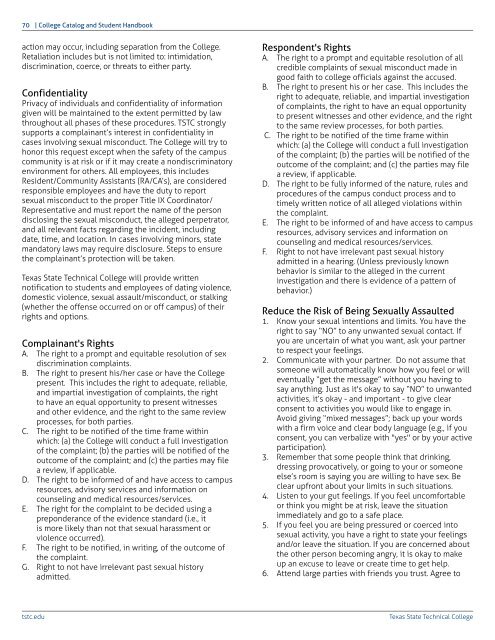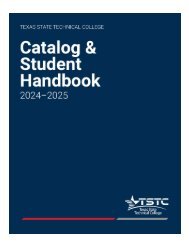Student Handbook and Catalog 2021-22 V2
You also want an ePaper? Increase the reach of your titles
YUMPU automatically turns print PDFs into web optimized ePapers that Google loves.
70 | College <strong>Catalog</strong> <strong>and</strong> <strong>Student</strong> <strong>H<strong>and</strong>book</strong><br />
action may occur, including separation from the College.<br />
Retaliation includes but is not limited to: intimidation,<br />
discrimination, coerce, or threats to either party.<br />
Confidentiality<br />
Privacy of individuals <strong>and</strong> confidentiality of information<br />
given will be maintained to the extent permitted by law<br />
throughout all phases of these procedures. TSTC strongly<br />
supports a complainant’s interest in confidentiality in<br />
cases involving sexual misconduct. The College will try to<br />
honor this request except when the safety of the campus<br />
community is at risk or if it may create a nondiscriminatory<br />
environment for others. All employees, this includes<br />
Resident/Community Assistants (RA/CA’s), are considered<br />
responsible employees <strong>and</strong> have the duty to report<br />
sexual misconduct to the proper Title IX Coordinator/<br />
Representative <strong>and</strong> must report the name of the person<br />
disclosing the sexual misconduct, the alleged perpetrator,<br />
<strong>and</strong> all relevant facts regarding the incident, including<br />
date, time, <strong>and</strong> location. In cases involving minors, state<br />
m<strong>and</strong>atory laws may require disclosure. Steps to ensure<br />
the complainant’s protection will be taken.<br />
Texas State Technical College will provide written<br />
notification to students <strong>and</strong> employees of dating violence,<br />
domestic violence, sexual assault/misconduct, or stalking<br />
(whether the offense occurred on or off campus) of their<br />
rights <strong>and</strong> options.<br />
Complainant's Rights<br />
A. The right to a prompt <strong>and</strong> equitable resolution of sex<br />
discrimination complaints.<br />
B. The right to present his/her case or have the College<br />
present. This includes the right to adequate, reliable,<br />
<strong>and</strong> impartial investigation of complaints, the right<br />
to have an equal opportunity to present witnesses<br />
<strong>and</strong> other evidence, <strong>and</strong> the right to the same review<br />
processes, for both parties.<br />
C. The right to be notified of the time frame within<br />
which: (a) the College will conduct a full investigation<br />
of the complaint; (b) the parties will be notified of the<br />
outcome of the complaint; <strong>and</strong> (c) the parties may file<br />
a review, if applicable.<br />
D. The right to be informed of <strong>and</strong> have access to campus<br />
resources, advisory services <strong>and</strong> information on<br />
counseling <strong>and</strong> medical resources/services.<br />
E. The right for the complaint to be decided using a<br />
preponderance of the evidence st<strong>and</strong>ard (i.e., it<br />
is more likely than not that sexual harassment or<br />
violence occurred).<br />
F. The right to be notified, in writing, of the outcome of<br />
the complaint.<br />
G. Right to not have irrelevant past sexual history<br />
admitted.<br />
Respondent's Rights<br />
A. The right to a prompt <strong>and</strong> equitable resolution of all<br />
credible complaints of sexual misconduct made in<br />
good faith to college officials against the accused.<br />
B. The right to present his or her case. This includes the<br />
right to adequate, reliable, <strong>and</strong> impartial investigation<br />
of complaints, the right to have an equal opportunity<br />
to present witnesses <strong>and</strong> other evidence, <strong>and</strong> the right<br />
to the same review processes, for both parties.<br />
C. The right to be notified of the time frame within<br />
which: (a) the College will conduct a full investigation<br />
of the complaint; (b) the parties will be notified of the<br />
outcome of the complaint; <strong>and</strong> (c) the parties may file<br />
a review, if applicable.<br />
D. The right to be fully informed of the nature, rules <strong>and</strong><br />
procedures of the campus conduct process <strong>and</strong> to<br />
timely written notice of all alleged violations within<br />
the complaint.<br />
E. The right to be informed of <strong>and</strong> have access to campus<br />
resources, advisory services <strong>and</strong> information on<br />
counseling <strong>and</strong> medical resources/services.<br />
F. Right to not have irrelevant past sexual history<br />
admitted in a hearing. (Unless previously known<br />
behavior is similar to the alleged in the current<br />
investigation <strong>and</strong> there is evidence of a pattern of<br />
behavior.)<br />
Reduce the Risk of Being Sexually Assaulted<br />
1. Know your sexual intentions <strong>and</strong> limits. You have the<br />
right to say “NO” to any unwanted sexual contact. If<br />
you are uncertain of what you want, ask your partner<br />
to respect your feelings.<br />
2. Communicate with your partner. Do not assume that<br />
someone will automatically know how you feel or will<br />
eventually “get the message” without you having to<br />
say anything. Just as it's okay to say “NO” to unwanted<br />
activities, it’s okay - <strong>and</strong> important - to give clear<br />
consent to activities you would like to engage in.<br />
Avoid giving “mixed messages”; back up your words<br />
with a firm voice <strong>and</strong> clear body language (e.g., if you<br />
consent, you can verbalize with "yes" or by your active<br />
participation).<br />
3. Remember that some people think that drinking,<br />
dressing provocatively, or going to your or someone<br />
else’s room is saying you are willing to have sex. Be<br />
clear upfront about your limits in such situations.<br />
4. Listen to your gut feelings. If you feel uncomfortable<br />
or think you might be at risk, leave the situation<br />
immediately <strong>and</strong> go to a safe place.<br />
5. If you feel you are being pressured or coerced into<br />
sexual activity, you have a right to state your feelings<br />
<strong>and</strong>/or leave the situation. If you are concerned about<br />
the other person becoming angry, it is okay to make<br />
up an excuse to leave or create time to get help.<br />
6. Attend large parties with friends you trust. Agree to<br />
tstc.edu<br />
Texas State Technical College
















